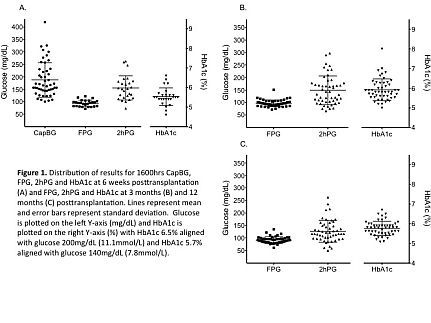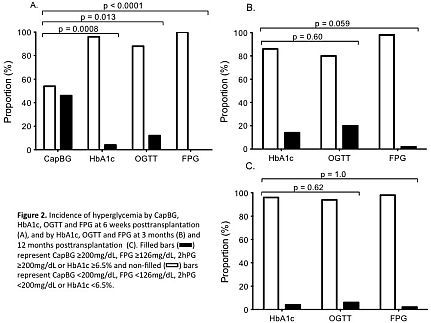Surveillance for Hyperglycemia Post Kidney Transplantation: Afternoon Glucose Superior to Conventional Tests in the First 6 Weeks
Medicine, University of Melbourne, Melbourne, Victoria, Australia
Nephrology, Western Hospital, Melbourne, Victoria, Australia
Epidemiology and Preventative Medicine, Monash University, Melbourne, Victoria, Australia
Diabetes and Endocrinology, Royal Melbourne Hospital, Melbourne, Victoria, Australia
Meeting: 2013 American Transplant Congress
Abstract number: D1481
Optimal screening for hyperglycemia after kidney transplantation remains uncertain. As plasma glucose peaks 7-8 hours after prednisolone administration, fasting plasma glucose (FPG) and oral glucose tolerance testing (OGTT) may be insensitive early posttransplant. When renal function and hemoglobin stabilise, HbA1c may gain utility.
We compared sensitivity of various methods for detecting posttransplant hyperglycemia. Capillary blood glucose testing (CapBG) was measured during the initial transplant admission. OGTT, FPG, HbA1c and 16:00hrs CapBG were compared at 6 weeks, while OGTT, FPG and HbA1c were compared at 3 and 12 months. Hyperglycemia was defined as CapBG≥200mg/dL, FPG≥126mg/dL, 2hPG≥200mg/dL or HbA1c≥6.5%.
Hyperglycemia was detected in 71% during the initial transplant admission (N=365). At 6 weeks, hyperglycemia was detected in 46% with CapBG versus 12% with OGTT (p=0.013), 4% with HbA1c (p=0.0008) and 0% with FPG (p<0.0001)(N=26)(Figures 1 and 2). At 3 months in 14% with HbA1c versus 20% with OGTT (p=0.60) and 2% with FPG (p=0.054)(N=50). At 12 months in 4% with HbA1c versus 6% with OGTT (p=1.0) and 2% with FPG (p=0.62)(N=51).


These findings suggest that FPG alone is inadequate to detect hyperglycemia within 6 weeks posttransplant, when screening should include1600hrs CapBG. Beyond 3 months HbA1c had similar sensitivity to OGTT and may be an alternative.
To cite this abstract in AMA style:
Cohney S, Fourlanos S, Colman P, Yates C. Surveillance for Hyperglycemia Post Kidney Transplantation: Afternoon Glucose Superior to Conventional Tests in the First 6 Weeks [abstract]. Am J Transplant. 2013; 13 (suppl 5). https://atcmeetingabstracts.com/abstract/surveillance-for-hyperglycemia-post-kidney-transplantation-afternoon-glucose-superior-to-conventional-tests-in-the-first-6-weeks/. Accessed February 16, 2026.« Back to 2013 American Transplant Congress
